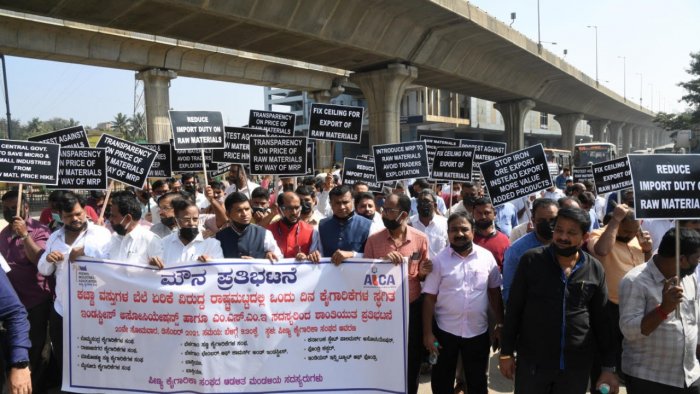MSMEs protest against rising input costs

Lakhs of micro, small and medium enterprises (MSME) across India, including those in Bengaluru’s Peenya industrial complex, went on a one-day strike on Monday to protest the steep rise in the prices of steel and raw materials including aluminium, copper and engineering plastics.
The strike was organised by the All India Council of Association of MSMEs (AICA), which represents 170 MSME associations.
The MSMEs have been facing one crisis after another since 2016 – demonetisation, the introduction of GST, the economic slowdown in 2019 and the Covid-19 lockdown in the first half of 2020.
Aluminium alloy prices have risen 154.7%, copper prices have jumped 119.4% and steel prices have climbed 82.2% in the period from April 2020 until October 2021, while those of kraft paper (packing grade) and engineering plastic have doubled, data from Bengaluru-based Peenya Industries Association showed. PIA represents 6,500 MSMEs.
AICA spokesman R Ramamurthy urged the Indian government to restore prices to 2020 levels.
“We have been hit by Covid already and to top it (off), the price hike is not being absorbed by the consumers. So, government intervention is urgently required for restoring the prices to pre-Covid levels”, Ramamurthy said.
Economic impact
PIA President B Muralikrishna, who pegged the association’s strike-related loss at Rs 500 crore, asked the government to cut import duty and do something to address the cartelization by steel manufacturers in order to control the sky-rocketing prices. The organisations will wait for about a month for the government to respond and then take a call on future plans of action, he added.
Several major organisations in Karnataka participated in Monday’s strike, including the Karnataka Small Scale Industries Association (KASSIA), the Bangalore Chamber of Industry and Commerce (BCIC) and the Federation of Karnataka Chambers of Commerce and Industry (FKCCI). They have held discussions with the central and state governments.
FKCCI has taken up the matter with Union Finance Minister Nirmala Sitharaman and requested her to come up with fresh measures to support the MSME sector.
“I made it very clear to the Union Finance Minister that if the government wants the MSME sector to survive, then urgent steps have to be taken,” FKCCI President I S Prasad said, highlighting problems including high customs duty and anti-dumping duty.
Others urged the government to make the sector a priority.
“The post of development commissioner of MSME ministry has been vacant for the past six months. This speaks volumes about how serious the government is with regards to the sector,” said KE Raghunathan, Convenor of the Consortium of Indian Association.
Over 10 lakh companies participated in the strike with an estimated loss of about Rs 15-25,000 crore including large scale industries, AICA’s Ramamurthy said, adding that losses from Coimbatore in Tamil Nadu alone are expected to top Rs 1,500 crore.
In Tamil Nadu
In Coimbatore, the Manchester of South India home to thousands of MSMEs, as many as 46 associations, including the influential Coimbatore District Small Industries Association, participated in the protest demanding the immediate intervention from the Centre.
“There is not even one raw material whose price has not increased exponentially in the past one-and-a-half years… How do we survive if the prices continue to increase?” asked K Maniraj, president, Coimbatore Pump Manufacturers Association. He added the Centre should constitute a Monitoring Committee with representatives from MSMEs that would oversee the prices of raw materials.
Over 40 crore individuals in the country are dependent on MSMEs and rued increase in prices of raw materials, according to M S Sampath, the president of the Madurai District Tiny and Small Scale Industries Association.
